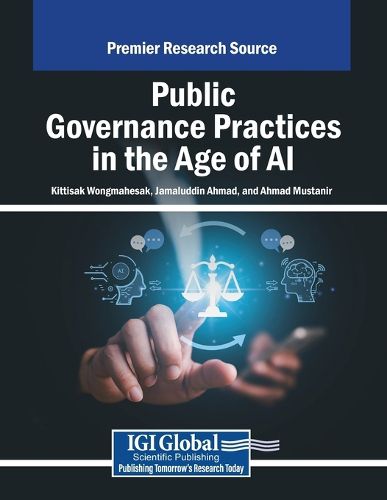Readings Newsletter
Become a Readings Member to make your shopping experience even easier.
Sign in or sign up for free!
You’re not far away from qualifying for FREE standard shipping within Australia
You’ve qualified for FREE standard shipping within Australia
The cart is loading…






This title is printed to order. This book may have been self-published. If so, we cannot guarantee the quality of the content. In the main most books will have gone through the editing process however some may not. We therefore suggest that you be aware of this before ordering this book. If in doubt check either the author or publisher’s details as we are unable to accept any returns unless they are faulty. Please contact us if you have any questions.
Advances in digital technology have driven public administration from new public administration (public administration 3.0) to digital public administration (public administration 4.0). In the same way, advances in artificial intelligence (AI) technology have driven digital public administration (public administration 4.0) into super smart society (public administration 5.0). With official recognition of its existence as a separate era, it can be said that AI is an important condition causing significant changes to public administration. Therefore, understanding it both in theory and in practice is very important. Public Governance Practices in the Age of AI explores the evolution of public administration in the digital age, highlighting the shift from traditional governance models to AI-driven public administration 5.0. It examines the transformative role of artificial intelligence in shaping policies, decision-making, and service delivery, offering insights into both theoretical frameworks and practical applications. Covering topics such as local administrative organizations, public participation, and global digital education, this book is an excellent resource for public administrators, public managers, educators, researchers, professionals, scholars, academicians, and more.
$9.00 standard shipping within Australia
FREE standard shipping within Australia for orders over $100.00
Express & International shipping calculated at checkout
Stock availability can be subject to change without notice. We recommend calling the shop or contacting our online team to check availability of low stock items. Please see our Shopping Online page for more details.
This title is printed to order. This book may have been self-published. If so, we cannot guarantee the quality of the content. In the main most books will have gone through the editing process however some may not. We therefore suggest that you be aware of this before ordering this book. If in doubt check either the author or publisher’s details as we are unable to accept any returns unless they are faulty. Please contact us if you have any questions.
Advances in digital technology have driven public administration from new public administration (public administration 3.0) to digital public administration (public administration 4.0). In the same way, advances in artificial intelligence (AI) technology have driven digital public administration (public administration 4.0) into super smart society (public administration 5.0). With official recognition of its existence as a separate era, it can be said that AI is an important condition causing significant changes to public administration. Therefore, understanding it both in theory and in practice is very important. Public Governance Practices in the Age of AI explores the evolution of public administration in the digital age, highlighting the shift from traditional governance models to AI-driven public administration 5.0. It examines the transformative role of artificial intelligence in shaping policies, decision-making, and service delivery, offering insights into both theoretical frameworks and practical applications. Covering topics such as local administrative organizations, public participation, and global digital education, this book is an excellent resource for public administrators, public managers, educators, researchers, professionals, scholars, academicians, and more.